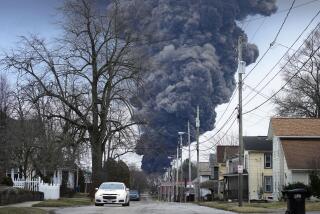U.S. Warned of âHoleâ in Its Ozone Policy : Adding Carbon Tetrachloride to Worldwide Phase-Out List Urged
WASHINGTON â Calling attention to what they said is a âholeâ in the governmentâs ozone policy, environmental groups warned Wednesday that the Earthâs protective ozone layer is threatened by a widely used chemical that would not be regulated under current proposals of the Bush Administration.
The Administration plan, endorsed last month by President Bush, would phase out worldwide production of a number of ozone-depleting chemicals by the end of the century in an attempt to protect the ozone layer from further damage.
Chemical Used Overseas
It would take no action, however, to control carbon tetrachloride, a chemical commonly used overseas as a solvent and one with even greater potential for destroying ozone than chlorofluorocarbons, generally recognized as the principal culprit in the thinning of the ozone layer.
If carbon tetrachloride is left unregulated worldwide, the environmentalists warned, its continued use would âwipe out a considerable portion of the gainsâ achieved in the Administration-backed phase-out of other substances.
âSome of the most dangerous chemicals have fallen through a hole in the U.S. ozone policy,â Mike Clark, president of the Environmental Policy Institute, said in releasing a âcritiqueâ of Administration policy by the Institute for Energy and Environmental Research.
Senior officials of the Environmental Protection Agency said Wednesday they recognize the potential harm that further use of carbon tetrachloride could cause. The agency this week published a notice indicating that it may put carbon tetrachloride and another chemical, methyl chloroform, on its list of ozone-depleting chemicals whose use should be regulated internationally.
In addition, Eileen Claussen, the EPAâs director of atmospheric programs, said she plans to present data at an international conference this weekend in Helsinki demonstrating that âyou have to do somethingâ to regulate carbon tetrachloride.
Signatories to Meet
The meeting is the first gathering of signatories to the Montreal Protocol, the landmark 1987 accord designed to protect the ozone layer.
The use of carbon tetrachloride as a solvent is banned in the United States because of its high toxicity. It is still used for production of chlorofluorocarbons in this country, but that is being ended as well under the new policy.
But the chemical is still widely used as a solvent in parts of Europe, the Soviet Union and much of the Third World.
Ozone, which is found in a layer of the stratosphere nine to 15 miles above the Earthâs surface, helps to shield the planet from harmful ultraviolet rays.
Man-made chemicals have been blamed for the significant depletion of ozone in recent years. The depletion has become so extensive over Antarctica during winter months that it is tantamount to a hole in the ozone layer. A mere 1% depletion in the ozone layer increases ultraviolet penetration by 2% and raises the risk of skin cancer by 4% to 5%, scientists believe.
The powerful ozone-depleting properties of carbon tetrachloride were acknowledged in a 1988 Environmental Protection Agency report that formed the basis of the current Administration phase-out policy.
That report apparently assumed that the problems caused by the chemical would be remedied by the phase-out of chlorofluorocarbons, or CFCs, in which carbon tetrachloride is used as an ingredient. However, the environmentalists cited World Meteorological Organization studies showing widespread use of the solvent.
Opposition in Third World
Opposition from some Third World nations already has jeopardized worldwide adoption of even the narrower chemical phase-out backed by the United States, Britain and other industrial states. The poorer countries contend that the phase-out of the chemicals would penalize them unduly.
The environmentalists contended, however, that carbon tetrachloride-based solvents can be replaced easily. They noted, in addition, that its high toxicity poses a threat to water quality and worker health that all nations might want to avoid.
More to Read
Sign up for Essential California
The most important California stories and recommendations in your inbox every morning.
You may occasionally receive promotional content from the Los Angeles Times.










